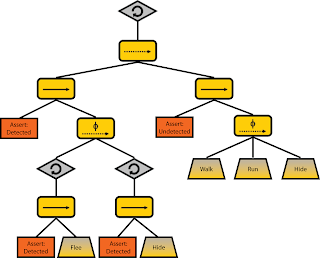Here is the logic behind the new and improved tree:
- Assumption: The enemy is all-knowing (knows where enemies are, where target is, etc)
- 4 basic actions: Walk, Run, Flee, Hide
- Note that these are subtrees (since they are behavior trees themselves
- 2 agent states: Detected, Undetected
- When Detected, Flee or Run until Undetected
- When Undetected, continue to make progress toward goal, unless Detected
- In any given state, the way an agent decides which action to take depends on its risk attitude
- Each agent will have parameter r_loving and r_averse, which sum to 1.0
- These parameters will be passed into stochastic selectors to determine which action to take next
- (I also plan to incorporate enemy distance into the calculation when computing probabilities for stochastic selectors, but I haven't come up with a precise equation yet)
I also played around some in Unity. I am now able to dynamically create an arbitrary map from a .txt config file in Unity. The camera view is orthographic, since I am working in 2D. I can also use the arrow keys to move my agent around for testing.
Things to do next:
- I'd like to add a visual marker on the agent to indicate what direction he's facing
- Have the camera following the target
- A* pathfinding

No comments:
Post a Comment